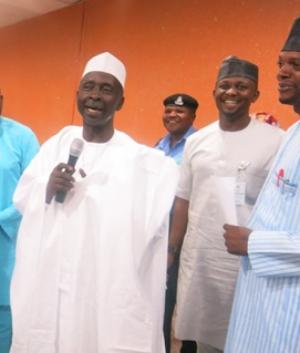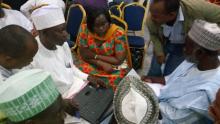Government collaborates with WHO and partners to deploy polio assets for strengthening routine immunization and primary healthcare.
Kaduna, 31 May 2016 - Kaduna State is working with partners, notably the World Health Organization (WHO), to put in place a plan that ensures investments in polio eradication do not dissipate into oblivion but rather contribute towards achievement of other public health interventions such as strengthening routine immunization (RI) and laying the groundwork for pursuing the health-related Sustainable Development Goals (SDGs). The state is confident that the collaboration will in turn; develop the system to the level where it is capable of meeting the health needs of a greater proportion of its citizens.
The Deputy Governor of Kaduna State, His Excellency Barnabas Bala Bantex gave the indication while declaring open, a retreat on RI held in Kaduna from 25 to 26 May 2016. The meeting, which was organized by NPHCDA/ National Polio Emergency Operations Center (NEOC), was designed for participants from 56 vulnerable local government areas (LGAs) across the six (6) geopolitical zones. The LGAs were categorized as vulnerable based on a risk algorithm which focused on acute flaccid paralysis surveillance, routine and supplemental immunization as well as special risk indicators.
“The state has already commenced utilization of inactivated polio vaccine and strengthening of acute flaccid paralysis surveillance. This is with a view to ensuring appropriate containment of the wild poliovirus according to agreed international protocols and national standards. We are also leveraging on the knowledge and lessons garnered over the last 20 years of the polio eradication initiative to strengthen other health initiatives” Mr Bantex stated.
He further observed that with Nigeria currently undergoing an epidemiological transition and the rise in communicable and non-communicable diseases; with children dying of avoidable vaccine preventable diseases (VPDs), the health system needs to be positioned to respond effectively to unfolding challenges and be able to offer quality services towards management of the associated co-morbidities of VPDs.
In her contributions for improved performance therefrom, the WHO Nigeria EPI Team Leader, Dr Fiona Braka, urged participants to use the skills and experience obtained from the polio structure to develop work plans that would assist in building a robust immunization system that would sustain the gains towards polio eradication.
During group work sessions, the participants from each vulnerable LGAs developed work plans to improve RI performance based on the identified issues in each LGA, and adopted some of the public health programmatic innovations that the Nigerian government and its polio partners have implemented. The identified activities will be implemented by the surge capacity personnel, engaged to interrupt polio transmission in Nigeria.
_________________________________________
For more information, please contact:
Technical contacts:
Dr Fiona Braka; Tel: +234 703 170 5252; Email: brakaf [at] who.inttarget="_blank"
Dr Audu Idowu; Tel: +234 803 700 5376; Email: musaau [at] who.int
Media contacts:
Ms Charity Warigon; Tel: +234 810 221 0093; Email: warigonc [at] who.int ( )target="_blank"
_________________________________________
Below:
01. Kaduna State Deputy Governor addressing participants at the retreat
02. Dr Fiona Braka with a vulnerable LGA during group work






